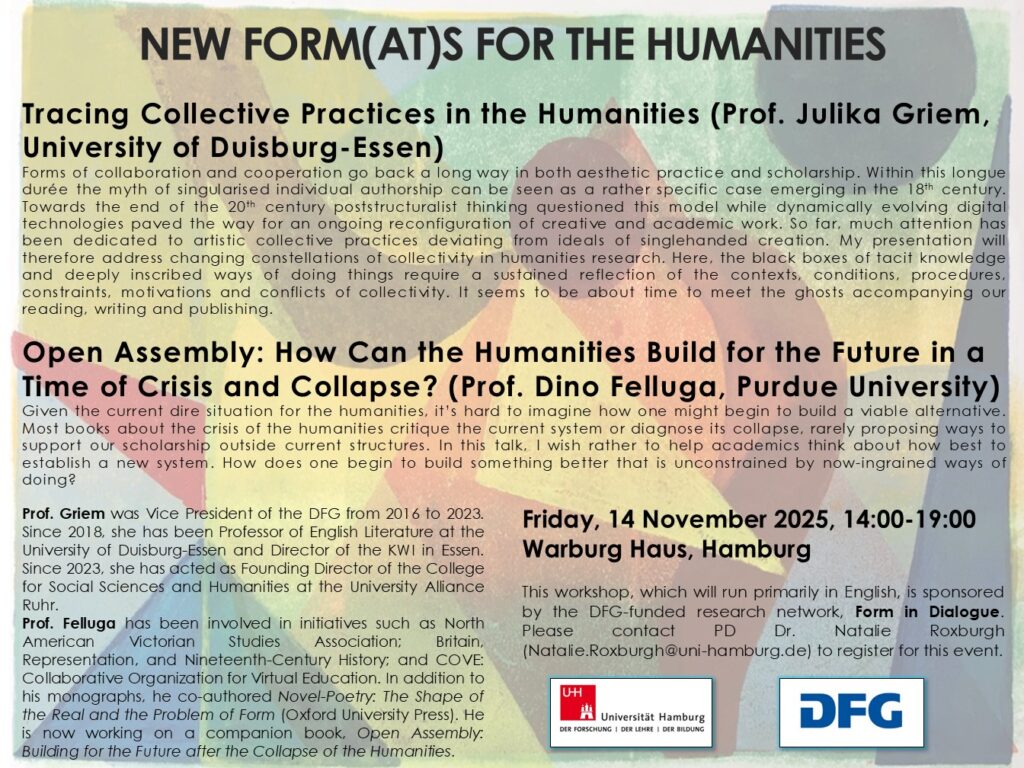3rd workshop: “Form as dialogue: form, formalism, formality”, 14-15 November 2025, Universität Hamburg
Guest speakers: Dino Felluga (Purdue University), Julika Griem (Kulturwissenschaftliches Institut Essen)

Final network conference, 11-13 June 2026
Universität Konstanz
Keynote speakers: Naomi Levine (Yale University), Emily Rosamond (Goldsmiths, University of London), John Chilver (Goldsmiths, University of London)
Call for Papers
Over recent decades, literary studies has seen a surge of interest in questions pertaining to aesthetic form. Such ‘new’ formalism has championed and called forth various formalist practices, in turn “strategic” (Levine 2006), “radical” (Brinkema 2014), “speculative” (Eyers 2017), “political” (Kornbluh 2019) or “ecological” (Griffiths 2021). While form is a notoriously malleable term, capable of encompassing even blatantly contradictory meanings, what most of these approaches share is an emphasis on the power – indeed, even on the agency – of form as well as an insistence on form as culturally and historically contingent. Form, in this sense, is not a stable container which can be filled with meaning, but it is dynamically established in and through discursive and emergent interrelations. Precisely because of its conceptual openness, then, form can serve as a nucleus in and around which different academic interests and approaches can converge and productively interact.
This conference aims to foster such practices of convergence and (productive) interaction, reaching beyond literary studies to look for common ground with other fields concerned with aesthetic practices, such as art, music, architecture or anthropology. Based on the assumption that what is valuable in form is precisely that it can serve to mediate between heterogeneous perspectives, we want to explore convergences and divergences in concepts of form and form’s relation to materiality, idea and realisation between the disciplines. Form, we maintain, is both the product of, and serves as an incitement for, a mode of dialogue which does not aim at consent, objectivity and telos but which welcomes and accommodates contradiction and which thrives by accepting ambiguity and contingency. Peter Womack suggests that scholars in the humanities are “haunted by the idea of dialogue”, as they claim to discuss, inquire or question stable assumptions, but that such a “promise of dialogue” usually turns out to be “a false prospectus, or a metaphor, or something in between” (2011: 9).
In an attempt to redeem this “promise of dialogue”, the aim of this conference (which serves as the concluding event of the DFG-funding network ‘Form in Dialogue’) is to reframe and potentially reconcile oppositions between ‘new’ and ‘old’ formalism, to juxtapose different disciplinary kinds of thinking about form and to open up new avenues for formal(ist) engagement with culture in a productive dialogue of diverging and converging positions.
Dialogue, in this sense, embodies a critical practice that understands itself as an open process rather than a teleology, and it has the potential to adequately address those conceptions of form favoured by much new formalist thinking: form as part of an ecology of relations, as a travelling concept, as a process of forming, as an event and as an agent.
In this spirit, we invite contributions on topics that could address (but are not limited to) these topics/questions:
– Is it possible (or even necessary) to define form? What are the social, cultural and political ramifications of such attempted definitions?
– Are forms in themselves dialogical? (How) do forms invite/invoke processes of critical practice?
– How can forms bring different disciplinary approaches or different interpretative practices into dialogue with one another?
– How can thinking about and through forms challenge a conventional understanding of disciplinarity and its presumed borders?
– Are there historical precedents for literary and cultural forms as dialogical processes?
– Can dialogue (about/through forms) help to productively combine formalism and critical theory, formalism and historicism, or formalism and (de)construction?
– What is the function of forms in an ecology of cultural and literary relations (between text, reader, critic, society…)?
– Does the emergence of AI and digitality necessitate a rethinking of aesthetic form?
– Can dialogue as a discursive practice generate new forms of critical academic engagement?
– How can dialogues about form affect the wider world, in teaching, outreach or political intervention?
– What sort of political action, justification or knowledge can aesthetic formalism (or aesthetic forms) engender?
– What is the role of the aesthetic in the dialogical conception of form?
…
Proposals (250-300 words) for 20-minute papers or alternative dialogic formats, together with a short biographical note (50-100 words) should be sent via email to Irmtraud Huber (irmtraud.huber@uni-konstanz.de), Natalie Roxburgh (Natalie.Roxburgh@uni-hamburg.de) and Wolfgang Funk (wfunk@uni-mainz.de) by 15 October 2025. Please include your name, your institutional affiliation and email address.
Bibliography
- Brinkema, Eugenie. The Forms of the Affects. Durham: Duke UP, 2014.
- Eyers, Tom. Speculative Formalism: Literature, Theory, and the Critical Present. Evanston, IL: Northwestern UP, 2017.
- Griffiths, Devin. “The Ecology of Form.” Critical Inquiry 48.1 (2021): 68–93.
- Kornbluh, Anna. The Order of Forms: Realism, Formalism, and Social Space. Chicago: The U of Chicago P, 2019.
- Levine, Caroline. “Strategic Formalism: Toward a New Method in Cultural Studies.” Victorian Studies 48.4 (2006): 625–57.
- Levine, Caroline. Forms: Whole, Rhythm, Hierarchy, Network. Princeton: Princeton UP, 2015.
- Womack, Peter. Dialogue. London: Routledge, 2011.
Past Activities
Online Workshop, “Concepts, Genre Technology, Texts”, 20 March 2025
2nd workshop: “Form in dialogue: practices of exchange”, 8-9 November 2024, Johannes Gutenberg University Mainz
ZKF-Public Talk, “Emerging Forms”, 3 July 2024, Universität Konstanz
Online workshop,”Aspects of Form: Temporality and Cognition”. 4 March 2024
Inaugural workshop,”Forms of dialogue: concept, structure, strategy”, 17-18 November 2023, Universität Konstanz
